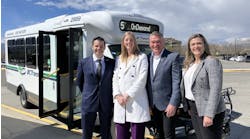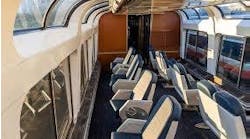Secretary LaHood, House Members Blumenauer, DeFazio, and Schrader, Portland Mayor Adams were joined by nearly 100 people, among them local elected officials and representatives from labor, business, transit, and green energy communities, at an event convened by the national Apollo Alliance at United Streetcar just outside of Portland, Oregon to promote job growth and American competitiveness in the global transit marketplace. Since 2005, America has sent roughly $10 billion overseas to purchase public transit equipment. The Apollo Alliance estimates that $40 billion per year of federal investment in public transit and rail, coupled with the right policies, could create 3.7 million American jobs – 600,000 in the manufacturing sector alone – and begin to meet the currently estimated $77 billion that is needed just to bring existing systems up to good repair.
U.S. Transportation Secretary Ray LaHood said, "To win the future and ensure America remains economically competitive in a global economy, we must out-innovate and out-build the rest of the world. That means building a transportation network that moves people and goods more safely, quickly and efficiently than ever before. Here in Portland, Oregon, United Streetcar is already realizing that vision by manufacturing the first modern streetcars in the nation, and building them entirely with American parts, labor and ingenuity."
At the media event, United Streetcar revealed its brand new 3100 foot streetcar track for onsite testing – the only one in the United States – as well as a new 6400 square foot environmental testing bay. "United Streetcar is a perfect example of how good public policy can not only create jobs, but also re-create an entire manufacturing sector. Our story tells exactly how the private sector and the Federal government can partner to grow the economy together," said United Streetcar's president Chandra Brown. "The Federal government believed in us and believed in American manufacturing. Now, we've had over $50 million in orders and there will be more to come as streetcars return to communities throughout the country. Should the federal government to adopt policy recommendations in Apollo Alliance’s Transportation Manufacturing Action Plan, United Streetcar's growth would be even more robust."
Congressman Earl Blumenauer said:
"Federal streetcar investment creates manufacturing jobs here in my District at United Streetcar. These investments also spur economic growth along transit routes, increase transportation choices, and reduce carbon emissions. I am delighted to partner with Secretary LaHood and the Apollo Alliance to promote the vital and remarkable achievements going on here at United Streetcar."
Congressman Kurt Schrader said:
"Instead of sending billions of dollars abroad to buy foreign-made equipment we should be spending that money right here in Oregon," said Schrader. "By supporting U.S. manufacturers, like United Streetcar, we create good paying Oregon jobs. Initiatives like 'Buy America' are key to growing America's manufacturing sector and a great example of common sense regulations that support our local economy."
Congressman Peter DeFazio said:
"Oregon has been the leader in the rebirth of domestic street car manufacturing—producing the first American-made streetcar in over 70 years right here. Federal investment in transit and rail creates needed family-wage jobs here in the United States and helps to revitalize the critical U.S. manufacturing sector. We need more federal investment of this type to help long-term economic growth and viability."


